BEIJING, Feb. 2, 2021 /PRNewswire/ -- The fifth Wound Ostomy Continence Forum (WOCF) was held on January 30, 2021 with an aim of exchanging viewpoints on the world's leading approaches to nursing and of sharing clinical experiences in a move to facilitate the enhancement of Chinese nursing skills. Healthcare workers specialized in these skills sets from Asia, Europe and the United States engaged in in-depth conversations on ostomy, wound and continence care.
Over the years, WOCF has been recognized as one of the most influential events in the ostomy, wound and continence care sectors. This year's forum was held online, with more than 5,000 professionals in attendance, a new record for the event. Wang Ling, Director at the Ostomy, Wound and Continence Nursing Council of the Chinese Nursing Association (CNA) said during her speech that the WOCF had invited medical and nursing professionals from around the world to come together with the express goal of providing professional and academic support for better specialized nursing services, injecting new ideas and vitality into the next stage of development of the nursing sector and further enhancing the quality of nursing in China through a series of comprehensive, multi-faceted professional exchanges.
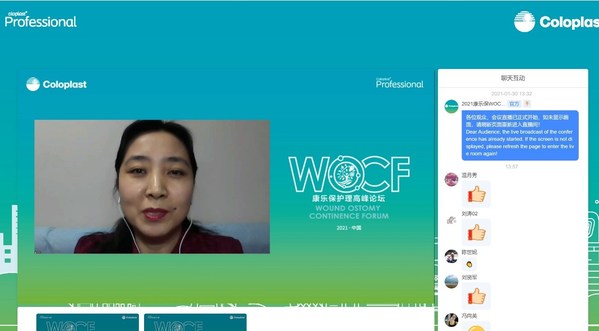
Wang Ling, Director at the Ostomy, Wound and Continence Nursing Council of the Chinese Nursing Association, delivering a speech at the forum.
International experts share the latest theories and technologies in three major areas
Providing the highest level of professional care that adheres to a standardized set of protocols post-surgery is key to assuring the success of the procedure. At this year's WOCF, Laurent Chabal, President-designate of the World Council of Enterostomal Therapists, elaborated for the first time to Chinese healthcare professionals on the second edition of the International Ostomy Guideline. After collecting research from three authoritative professional databases and selecting some 300 articles, the guideline was reviewed and finalized by 104 experts in the field and 22 organizations. With content covering education, best practices, holistic analysis methods, pre- and post-operative nursing needs, the guideline provides the latest and most appropriate theoretical and practical guidance for ostomy nursing.
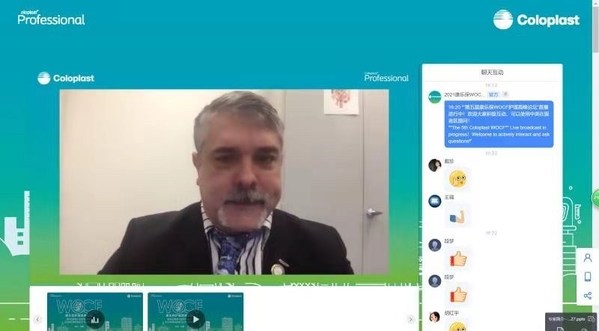
Mr. Laurent Chabal, President-designate of the World Council of Enterostomal Therapists, giving a presentation on the second edition of the International Ostomy Guideline at the forum.
As a pioneer in ostomy care, Coloplast provides safer, better-fitting, and more private solutions to meet the individualized needs of ostomy patients from children to adults with new products based on professional approaches to treatment coupled with strong R&D capabilities. At the same time, Coloplast has been actively building an educational platform, undertaking advanced research and introducing new approaches to ostomy care, all of which has added up to a significant contribution to the enhancement in the quality of nursing in China.
With the rapid improvement in and the ongoing development of wound nursing technology, nursing methods are iteratively upgraded. Dr. David Keast, Medical Director of the Chronic Wound Management Clinic under the Parkwood Institute Research program in London, Ontario, Canada, shared the recently published international consensus on exudate and cavity management at the forum. This is the first international consensus of its kind to provide consistent nursing advice to medical staff, emphasizing that the key to effectively managing the cavity between the dressing and the wound is to manage the exudate and create a suitable wet healing environment so as to shorten the healing time of wound. The consensus is based on evidence-based medical evidence and clinical practice. The corresponding wound care guidelines will be published in the near future.
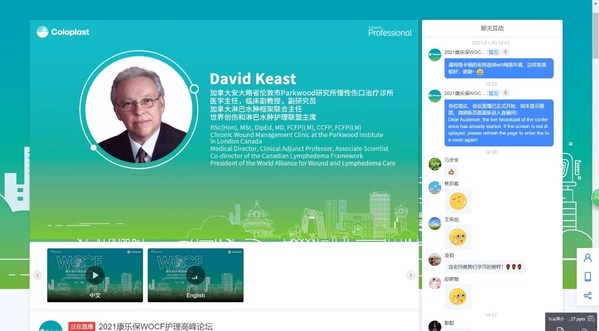
Dr. David Keast, Medical Director from the Chronic Wound Management Clinic under the Parkwood Institute Research program in Canada, sharing the first international consensus on exudate and cavity management at the forum.
With a goal of shortening the time that a wound needs to heal, Coloplast has been committed to providing excellent wound care solutions for clinical use and patient treatment for more than 30 years. At the same time, the firm advocates for more attention from academic circles into the subject of wound nursing, participates in the authoring and publication of international consensus on exudate management and performance improvement nursing in the operating room (the expert consensus on the steps that nurses need to take to prevent intraoperative acquired stress injury and what needs to be done in the event such an injury occurs ), while providing scientific guidance for clinical practice.
Dr. Helmut Madersbacher, Chairman at the International Neuro-Urology Society, gave a detailed presentation on the leading European intermittent catheterization methods for neurogenic bladder emptying. This methodology, mainly used for the treatment of neurogenic bladder in patients with spinal cord injury (SCI), can effectively reduce the risk of urethral injury and urinary tract infection and improve the patient's quality of life. At present, intermittent catheterization has become the standard protocol in Europe for managing neurogenic bladder.
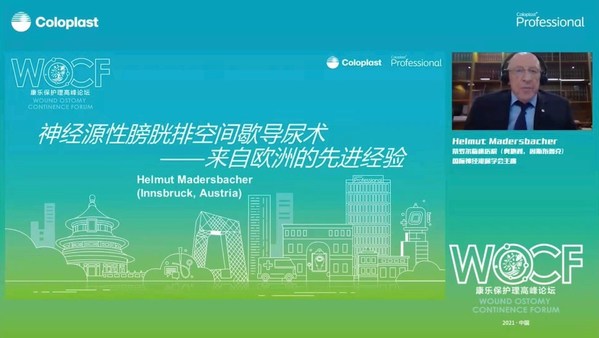
Dr. Helmut Madersbacher, Chairman at the International Neuro-Urology Society, explaining the intermittent catheterization methods for neurogenic bladder emptying.
As a market leader in global intermittent urinary incontinence care, Coloplast has been working to improve the diagnosis and treatment of neurogenic bladder in SCI patients in China, as well as the quality of the nursing needed to treat the condition. The firms strongly advocates for dialogue and cooperation between urology and rehabilitation departments, with the goal of unifying and perfecting the diagnosis and treatment of neurogenic bladder as well as the associated nursing protocols, and making the application of disposable hydrophilic coated catheter a gold standard for bladder management in patients with SCI.
Getting insight into various clinical scenarios to meet patients' differentiated needs
At this year's WOCF, Coloplast launched three new products based on its core concept of "fully listening to patients' needs", including SenSura® Mio Kids Ostomy series of products, Brava® Elastic Tape Belt for abdominal ostomy and Biatain® Silicone Lite Foam Dressings.
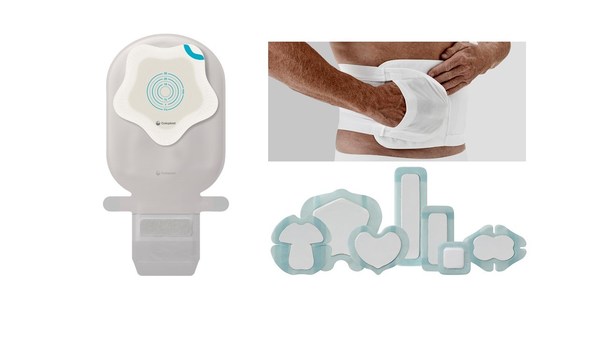
Left: SenSura® Mio Kids Ostomy series of products Upper right: Brava® Elastic Tape Belt for abdominal ostomy Lower right: Biatain® Silicone Lite Foam Wound Dressings
Among them, the design of the star-shaped barrier of the SenSura® Mio Kids Ostomy series considers the physiological characteristics of children with ostomies and fully meets their needs in terms of body fit, activity compliance and skin protection. The Brava® Elastic Tape Belt for abdominal ostomy is specially designed for the management of parastatal hernia. The breathable, four-way stretch fabric provides effective support and is comfortable to wear. The unique design of the cuttable area meets the needs for cutting holes that can be customized to the individual patient and provides a new choice for the prevention and non-surgical treatment of parastatal hernia. For wounds that are in hard-to-reach locations causing difficulties in applying a bandage, Biatain® Silicone Lite Foam Wound Dressings has been developed for use on wound surfaces, including for surgical/critical patients with pressure sores, lower extremity venous ulcer, post-operative incisions, diabetic foot and other wounds.
Sui Chenghao, Senior Vice President of Coloplast in Asia, said: "Our mission is to make life easier for people with intimate healthcare needs. We work closely with medical professionals across a wide array of disciplines to improve the quality of life of the patient through the adoption of the most recommended approaches in tandem with the highest quality products, driving the enhancement of the quality of nursing care throughout China."